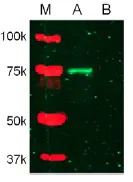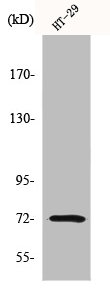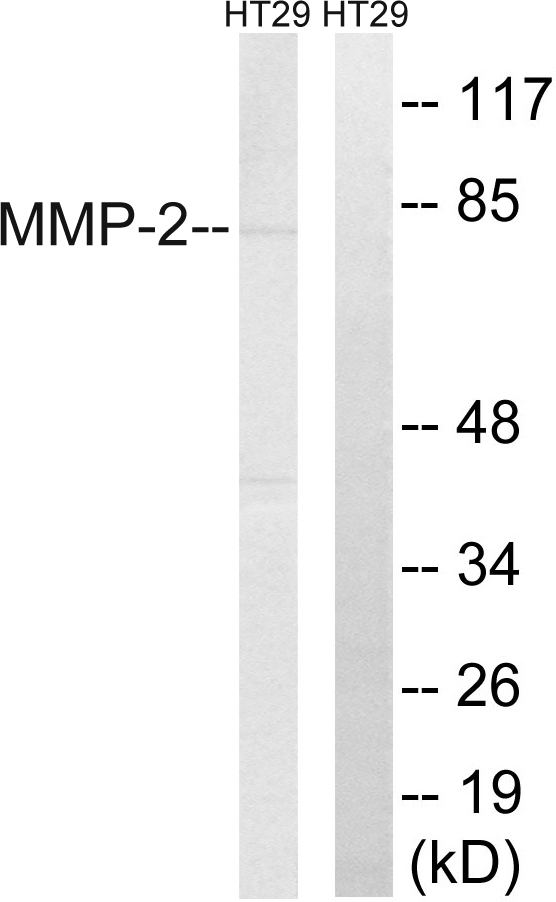
Western blot analysis of human recombinant MMP-2 with GTX25704. Protein band was detected at ~72 kDa (A); the band was blocked by the immunizing peptide (B).
MMP2 antibody
GTX25704
ApplicationsImmunoPrecipitation, Western Blot, ELISA
Product group Antibodies
ReactivityBovine, Canine, Human, Mouse, Rat
TargetMMP2
Overview
- SupplierGeneTex
- Product NameMMP2 antibody
- Delivery Days Customer9
- Application Supplier NoteFor ELISA: Use at a concentration of 0.1 - 1.0microg/ml. For IP: Use at a concentration of 3.0 - 5.0 microg/extract from 10^6 cells. For WB: Use at a concentration of 0.5 - 2microg/ml. Optimal dilutions/concentrations should be determined by the researcher.
- ApplicationsImmunoPrecipitation, Western Blot, ELISA
- CertificationResearch Use Only
- ClonalityPolyclonal
- Concentration0.2 mg/ml
- ConjugateUnconjugated
- Gene ID4313
- Target nameMMP2
- Target descriptionmatrix metallopeptidase 2
- Target synonymsCLG4, CLG4A, MMP-2, MMP-II, MONA, TBE-1, 72 kDa type IV collagenase, collagenase type IV-A, matrix metallopeptidase 2 (gelatinase A, 72kDa gelatinase, 72kDa type IV collagenase), matrix metalloproteinase-2, matrix metalloproteinase-II, neutrophil gelatinase
- HostRabbit
- IsotypeIgG
- Protein IDP08253
- Protein Name72 kDa type IV collagenase
- Scientific DescriptionThis gene is a member of the matrix metalloproteinase (MMP) gene family, that are zinc-dependent enzymes capable of cleaving components of the extracellular matrix and molecules involved in signal transduction. The protein encoded by this gene is a gelatinase A, type IV collagenase, that contains three fibronectin type II repeats in its catalytic site that allow binding of denatured type IV and V collagen and elastin. Unlike most MMP family members, activation of this protein can occur on the cell membrane. This enzyme can be activated extracellularly by proteases, or, intracellulary by its S-glutathiolation with no requirement for proteolytical removal of the pro-domain. This protein is thought to be involved in multiple pathways including roles in the nervous system, endometrial menstrual breakdown, regulation of vascularization, and metastasis. Mutations in this gene have been associated with Winchester syndrome and Nodulosis-Arthropathy-Osteolysis (NAO) syndrome. Alternative splicing results in multiple transcript variants encoding different isoforms. [provided by RefSeq, Oct 2014]
- ReactivityBovine, Canine, Human, Mouse, Rat
- Storage Instruction2°C to 8°C
- UNSPSC41116161
References
- Evidence of acrolein in synovial fluid of dogs with osteoarthritis as a potential inflammatory biomarker. Herr SA et al., 2021 Oct 20, BMC Musculoskelet DisordRead this paper







![WB analysis of multiple samples using GTX27033 MMP2 antibody [2C1]. Lane 1 : human recombinant mmp-2 Lane 2 : schwann cell](https://www.genetex.com/upload/website/prouct_img/normal/GTX27033/GTX27033_1302_WB_w_23060722_957.webp)
![WB analysis of pro-MMP2 (lane 1), active MMP2 (lane 2) and human pressure ulcer biopsy (lane 3) using GTX30147 MMP2 antibody [8B4].](https://www.genetex.com/upload/website/prouct_img/normal/GTX30147/GTX30147_1348_WB_w_23060722_491.webp)